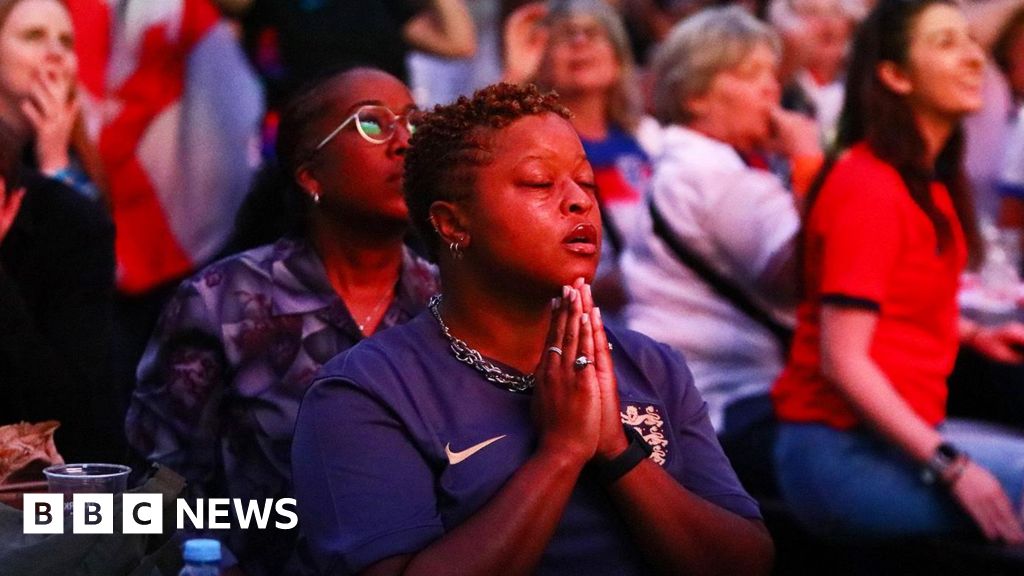Nervous about the Euro 2025 final? Heres your survival guide for the big match
- BBC News
If youre a fan of the England womens football team, chances are youve been on a bit of an emotional rollercoaster.
An agonisingly close quarter-final against Sweden ended with a tense penalty shootout, while an equalising semi-final goal from Michelle Agyemang only happened in the 96th minute.
"I feel like Im going to have to go to the doctors when I get home," says Jenny, from Kent, who watched it all from the stands.
"They are putting us through the ringer."
"I basically bit all my nails off," says Sophie, who is in Switzerland with her sister, Charlotte.
Meanwhile, Nicola, from Basingstoke, describes feeling shaky. "I had to take some time to decompress."
Even if you werent watching the action with thousands of other jittery fans in the stadium, chances are youve felt some of the same effects. But whether youre in the stands or on the sofa, why do football matches produce such intense physical reactions?
The answer lies in our hormones says Dr Martha Newson, Associate Professor in Psychology at the University of Greenwich.
Testosterone, she explains, goes up on match days, as does adrenaline and the stress hormone cortisol. The most loyal fans have the biggest stress response, she says, and thats the same for men and women.
During peaks in the game - like a nail-biting penalty shootout - the adrenaline rush, or fight or flight response, prepares the body for action, says Dr David Crepaz-Keay, Head of Research and Applied Learning at the Mental Health Foundation.
While it can feel scary, theres nothing to be alarmed about - its a sign that you care.
"You are just completely there with them and its like youre walking up to the spot, ready to take that penalty… your senses are just going into overdrive."
The heart rate rises as it rushes to send more oxygen around the body. And if you feel buzzy, he says, thats because the effects can act as stimulant.
They can last for hours, affecting our sleep as we come down from our excitement and can even influence our behaviour the following day. Dont be surprised if you feel like eating more after the match or getting out the credit card.
"Fans consume more calories after a loss," says Dr Newson, explaining that theyre responding to a psychological need to replenish their reserves after a time of hardship.
On the flip side, fans might feel an urge to splurge after a win. "We can see the evolutionary mind working like, okay, Ive won so I can spend money, I can accumulate resources," she says.
All this for a sport thats supposed to be about fun and bonding. So what can fans do to manage these very real side-effects?
Dr Joseph Barker, a clinical psychologist for the NHS and Lecturer in Clinical Psychology at Norwich Medical School, advises getting a good rest the night before.
Having a clear match day plan of where you are going, what you are doing and what you are likely to do afterwards will also help alleviate stress.
"As weve got no control during the game, if we can find things to control before and after the game that can build our emotional resilience to cope."
Its important to eat well, he says, and as much as it might be tempting, he advises against drinking alcohol, because it gives us less ability to regulate our emotions.
If things get too tense, he says fans can always take a break and rejoin the match a bit later.
Dr Crepaz-Keay says movement is key to help manage that adrenaline surge - when your body is geared up for action, theres nowhere for that energy to go if you stay on the sofa. But just remember to keep anything breakable out of arm and leg reach.
Most of all, the experts advise trying to reframe the nerves and jitters as an enjoyable experience.
"In England particularly, we are not necessarily brought up to express our emotions. And sport gives us the excuse to do that. Sport gives us licence to shout, to scream, to dance, to cheer, to sing," says Dr Crepaz-Keay.
"Even if we dont win, youre still part of something bigger... thats something that we can all take pride and joy in."
Its a view shared by Jenny and Charlotte in Geneva.
Charlotte advises embracing the stress and having patience as "anything can happen in the last second".
"Youre going to get overwhelmed and your heart rate will go up… but this is really exciting."
Additional reporting by Elise Wicker and Yazmina Garcia